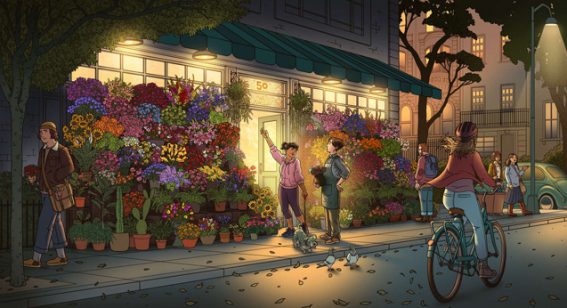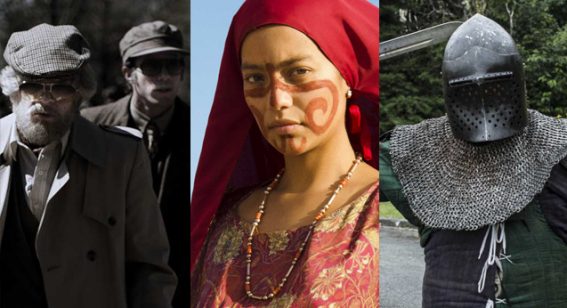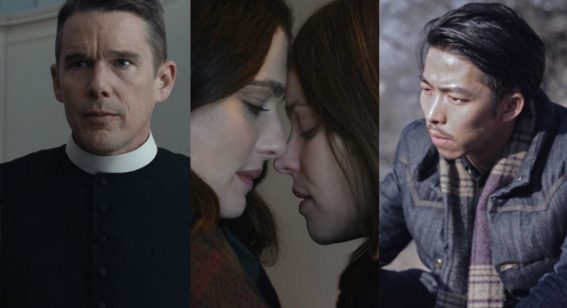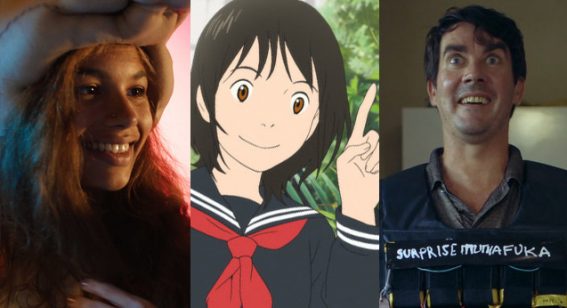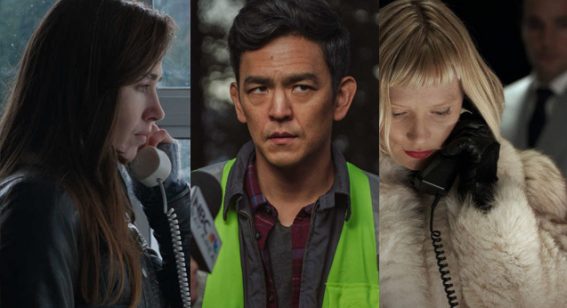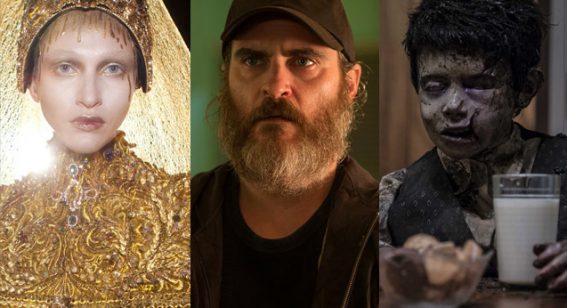NZIFF 2018 mini-reviews (H to L)
What we’ve seen, loved, and maybe not loved.
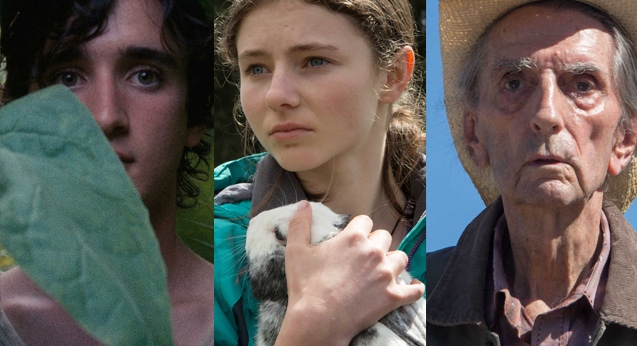
Flicks has sent its mighty writers all over the Auckland section of the New Zealand International Film Festival. Here are the films we’ve seen and what we’ve thought of them. (This page is updated daily-ish.)
Happy As Lazzaro
Yet another festival contender for “wildest location versus most affecting story”, Happy As Lazzaro is joyfully unpredictable. Beginning life on a rural Italian tobacco farm, this expertly crafted tale (it shared Best Screenplay at Cannes) follows our sweet-hearted, wide-eyed young Lazzaro up and down some most unexpected paths. Director and writer both, Alice Rohrwacher is a filmmaker who can now unquestionably be trusted to make meaningful movie magic, and newcomer Adriano Tardiolo as Lazzaro needs to be inspected for concealed wings after this angelic turn. -MATTHEW CRAWLEY
The Heart Dances – The Journey of The Piano: the Ballet
Crossing Rachmaninoff director Rebecca Tansley follows The Royal New Zealand Ballet’s preparations for The Piano. Outstanding access, cinematography and editing, coupled with an excellent soundtrack, hold the attention as the creatives wrestle with the cultural quandary inherent in the story they are trying to tell in a company with no Māori dancers. The usual making-of tropes are here, but where things get really fascinating are in watching dancer and Māori cultural advisor Moss Patterson politely but firmly negotiate the quagmire. Fascinating for all the wrong reasons, it’s an object lesson in how creative and cultural partnerships need to be carefully considered. -ADAM FRESCO
Holiday
Sex and violence, power and control pervade this luxe debut feature from Denmark’s Isabella Eklöf. Tacky neons and overbearing sunshine expertly complement the film’s tone. Victoria Carmen Sonne intrigues as gangster trophy girlfriend Sascha, the definition of a girl along for the ride. Boundaries are disregarded, assault permeates, yet Sascha retains the last word. I can’t wait for whatever Eklöf does next. -AMANDA JANE ROBINSON
Already somewhat infamous for its disturbing and extremely explicit depiction of sexual violence, Holiday is a sharp, canny, and definitely not for everyone. Following Sascha, a young Danish woman newly initiated as arm candy for magnetic and sadistic gangster patriarch Michael, as she joins him for the summer in a lavish Turkish villa. Writer-director Isabella Eklof’s debut may be shocking but it is also deeply nuanced, with Sascha, ostensibly a victim, remaining an opaque figure throughout. Does she really lack any common sense or is there something radical in her choice to completely acquiesce to a violent, vapid consumerist lifestyle? From a female director, these questions are galling but not glib – and, if you have the stomach, worth considering. -KATIE PARKER
Not an easy breezy sun, sandals and ice cream watch, Swedish director Isabella Eklöf’s first feature Holiday does nonetheless have all these things, along with a hefty dose of unsettling human behaviour. The sleek trappings of the wealthy Turkish holiday resort young Sascha arrives at as she is indoctrinated into the “family” of associates and friends staying with her Danish drug dealer boyfriend, contrasts with her cheap fast fashion vibe, and it seems she is very much the latest throwaway toy. Often alone, a sense of disconnect is apparent in Sascha (Victoria Carmen Sonne) perhaps developed as a coping mechanism for Michael’s machismo assertion of ownership and sporadic assaults. Eklöf tableaus the cast with clinical precision, favouring choreographed locked off shots that are somewhat distanced – allowing the viewer to assimilate even graphic scenes without overwhelming emotional connection. – SARAH VOON
Hunger
Is it the height of white male privilege to starve while a sense of pompous superiority convinces you that you are a genius writer without ever being seen to do very much of said writing? Yeah, probably, but Hunger still generates plenty of drama and some unexpected humour from this tale of a chap struggling with career, economy, romance, foul-looking teeth and toughest of all, himself, in 1890 Norway (what a shithole). Striking black and white cinematography, social realism, and an annoyingly believable lead performance. -STEVE NEWALL
My first film of this fest, 11am on a Friday at the Academy. there’s a certain sadness to this theatre, it wafts up my trousers as I trudge down the stairs, into the dark void. I knew nothing of this but within the first minute I knew it was what I wanted. Bleak in the best way. A 1966 riff on madness and hunger in all senses of the word. A shabby, no chic, black and white epic, a week in the life of a struggling artist set in a few blocks of a late 1800s Scandinavian town. I’ll be looking for other work from director Henning Carlsen. Stunning. -PAUL CASSERLY
I Used To Be Normal – A Boyband Fangirl Story
A joyous validation of that most cloistered, most frightening of societal ills: burgeoning female sexuality. Avoiding broad doco brushstrokes in favour of following incredibly personal narratives, I Used To Be Normal manages, through the cipher of boyband obsession, to highlight the comforts, thrills and associated shames that define a particularly female kind of self-discovery. -SARAH THOMSON
This delightful doco, directed by Jessica Leski, follows four women of different ages and nationalities over a few years of their individual Boyband passions. Lighthearted to start, interspersed with naive animation, and various Boyband/audience footage, you laugh out loud in recognition of the intense and sometimes goofy adolescent feelings so prominently on display, and (in my case) my teenage fangirl daughter squeezing my hand and giggling “relatable!”. As the doco progresses, the women evaluate and confront how their infatuations have affected their lives with some surprisingly poignant and heart-wrenching reflections. From One Direction, the Backstreet Boys and Take That, to The Beatles, I Used To Be Normal – A Boyband Fangirl Story is an exploration of the immense energy and joy it takes to be a true fangirl. -SARAH VOON
In the Realm of Perfection
Two pieces of advice: don’t go into this expecting a standard sports doco, and try not to sit encircled by boomer couples who chat all the way through (the ones by me would have copped a gobful or racket if McEnroe was there in the flesh). In turns engrossing and infuriating – a bit like the enigma himself – this film, culled from the archives of an idiosyncratic tennis demonstration filmmaker tries a bit too hard to be a film-about-making-a-film. Plays more cute/clever than necessary sometimes when it would have been better off sticking to the voyeuristic and immediate primary footage or at least dialing back the meta a tad, many instances of which feel laboured. -STEVE NEWALL
The Insult
Big populist movies that traffic in heavy ideas about race and religion are basically a thing of the past in Western cinema, so this Lebanese legal drama feels like a breath of fresh air. Centering on a war of words between a displaced Palestinian and a Lebanese Christian that spirals out to envelop a whole community, The Insult goes out of its way to keep complicating its own premise and is stronger for it. It’s a broad, easily accessible film and as such there are a few overly neat plot contrivances and a healthy dollop of schmaltz, but considering the relevance of the (ongoing) struggles portrayed that is very easily forgivable. -TONY STAMP
Gripping stuff, as an escalating series of events elevates a simple drainage dispute into one that verges on geopolitical flashpoint. A Christian and Palestinian clash in the street and then courtroom of Lebanon, each at fault to some degree, and neither backing down, in a standoff that exposes prejudices and grows extremely out of control – and almost beyond the legal system’s ability to adjudicate. Third act courtroom dramatics stretch credulity and things wrap up a little too pat, but this is a fine effort working from a tried and tested legal drama formula. -STEVE NEWALL
Jirga
Close-up insight into some of the world’s lesser seen cultures and countries has been one of the most rewarding themes of this festival, and with its many extraordinary locations throughout Afghanistan, Jirga would be tough to beat in this sense. Unfortunately, though, with some questionable acting from our “Aussie ex-soldier on a mission” lead, and a story arc that should come off more dramatically than it does, the film winds up feeling just a tad like an exercise in exorcising a little bit of White Man’s Guilt. -MATTHEW CRAWLEY
Juliet, Naked
Adapted from the novel by Nick Hornby, Juliet, Naked follows Annie, a nice, sensible cardigan wearing British woman stuck in a dead-end relationship with a useless mansplaining boyfriend – that is, until she enters into an unlikely pen-friendship with said boyfriend’s washed-up musical idol. Sparks fly, leases on life are renewed and sex is agreed upon verbally before anyone touches anyone. Very cute and entertaining, if not particularly edifying, Juliet, Naked is a pleasant British rom-com and a nice respite from some of the more harrowing NZIFF entries. KATIE PARKER
Keep the Change
An unexpected charmer of this year’s selection, first-time filmmaker Rachel Israel’s little love story about an obnoxious pest in a suit jacket and sunglasses, and an earnest show tunes fanatic follows the conventions of romantic comedy to the letter, but the autism support group setting and an empathy for the plight of the pair makes Keep The Change feel entirely unique. Packed with moments that would make Larry David wince, but never exploiting its characters for cheap laughs, the movie balances with ease on the tightrope of its topic. Filmed, thank goodness, using a cast comprised primarily of actors with autism, and with leads Brandon Polansky and Samantha Elisofon incorporating their real-life traits into the story, everything here rings true. -MATTHEW CRAWLEY
Lean On Pete
Whatever the Great American Roadtrip is meant to be, Lean On Pete is its lonesome cousin, the Broken Young American Wander Through Back Streets And Stunning Melancholic Landscapes tale. While it’s always an absolute pleasure to see Steve Buscemi and Chloë Sevigny in action, it’s relative newcomer Charlie Plummer who steals the show… and a few other things along the way. His vulnerable, hopeless, and naive-but-driven character makes for a unique lead to follow, and watching him navigate his trail of increasing despair is tough but truly rewarding. Not afraid to linger within a difficult moment or let his audience take their time with a beautiful dusky night sky, director Andrew Haigh has created something slow and steady here that wins the race in style. -MATTHEW CRAWLEY
Leave No Trace
If we’re still casting votes for the greatest actor of our generation, I’d like to nominate Ben Foster. He’s complemented here by a superb breakthrough performance from Thomasin McKenzie, both boosting Debra Granik’s purposefully restrained script that gradually leaks info about this father-daughter tale of societal distance. Foster reaches wide in expressing his character’s stability. McKenzie makes her character equally compelling, child-like and inquisitive yet independent and strong-willed. Combined, they form the beating heart of a quiet film that continues to whisper long after the film’s end. -LIAM MAGUREN
The opening stretch of Leave No Trace evokes the feeling of life out in the forest so well you might feel envious of Ben Foster and his daughter’s simple existence. From there, of course, things become complicated, and their dynamic is explored with oodles of empathy by director Debra Granik. It’s a deceptively complex story, and Foster’s wounded performance is only matched by Kiwi actress Thomasin McKenzie in a no-shit star-making turn. -TONY STAMP
A quiet meditation on military PTSD is fused with a troubling coming-of-age story here, but it’s all somehow completely beautiful. Much has been made of Thomasin McKenzie’s lead performance, but the real star is director Debra Granik. Her masterful, restrained style really is haunting – I didn’t feel the impact of this film fully until about a week after I saw it. It’ll stay with me for a long time. -DANIEL RUTLEDGE
Director Debra Granik follows up Winter’s Bone (the film that launched Jennifer Lawrence’s career), with a father-daughter relationship movie fuelled by standout performances by Ben Foster and newcomer Kiwi, Thomasin Harcourt McKenzie as 13-year-old Tom. Foster plays Will, an army vet living off the grid, bringing his daughter up as a back-to-nature, self-sufficient survivalist. Then child services try to intervene. Rather than going Rambo, Granik takes a far more naturalistic, dramatic and human route, focusing on character and compassion. Simple, subtle and soaked in symbolism, this is a powerful, slow-burning meditation on life and love, powered by two mesmerising performances. -ADAM FRESCO
The picturesque setting of Oregon’s forests, gorgeously depicted here, is likely to resonate with Kiwis, as will the notion of “going bush” that’s been embraced in self-sufficient fashion by Ben Foster’s character Will as Leave No Trace opens. Patiently detailing his relationship with his daughter Tom (Thomasin Harcourt McKenzie, earning every ounce of the praise leveled at her performance), this isn’t a “what happens next” thriller – indeed their woodland isolation is brought to a close early on – so much as a chronicle of Tom’s growth, a process that can’t be constrained by her dad’s trauma and rejection of society. McKenzie vividly depicts Tom’s internal life in a can’t-be-missed turn, while director Debra Granik keeps us spellbound, firmly invested in their tale both as a duo in remote landscapes and interweaving with others who don’t fit into traditional modern lifestyles. -STEVE NEWALL
Let The Corpses Tan
Features the huge close-ups of Sergio Leone, the surreal logic of Luis Buñuel, the batshit crazy of Alejandro Jodorowsky, and the demented colour-splash of Dario Argento. Belgian writer-directors Hélène Cattet and Bruno Forzani don’t let up on the crazy, in a downright entertaining, sure-fire cult-classic, playing like a psychedelic 1970s B-movie Spaghetti Western fan’s nutzoid dream. -ADAM FRESCO
Let the Corpses Tan, from double-trouble Belgian writer/director team Hélène Cattet and Bruno Forzani, is an eyeball- and audio-exploding, riotous feast of colour, retro shlock, and soundscape. Reminiscent of early Tarantino and Robert Rodriguez, and espousing a thoroughly conceptual genre, this gold heist, team of bandits, recluse artist, bondage shootout film is total immersion. -SARAH VOON
Intoxicating pulp hallucinogen, more fetish than pastiche. Paradise for Cattet/Forzani cultists. Newcomers, your entry point into their brand of post-Eurotrash sublime can start here. -AARON YAP
*Wind whistles through the hills* *Leather scrunches* *GUNFIRE!* *Heavy breathing*
Whip pan into snap zoom into EXTREME CLOSE-UP on my mouth, saying “if you like hyper-stylised films you should thoroughly enjoy this one”. -TONY STAMP
Russ Meyer meets Tarantino’s younger years in a high-saturation Belgian bullet-fest. Ticking all the schlock-boxes from Morricone soundtrack to guys driving way too fast, an impossible to keep track of, seemingly endless shoot-out, and ill-fated leather-clad cops, Let the Corpses Tan is an instant cult classic. If you only see one pulptastic, bonkers killing fiesta this festival, might I recommend you make it this one? -MATTHEW CRAWLEY
Liquid Sky
I didn’t dig this, the first major disappointment of the fest for me. Weird, yep, but also oddly boring and punctuated by surprising sexual violence that the film just… brushes off. If you’d come for a crazy colourful party film, like me, you’d be looking in the wrong place. Wooden performances and creaking narrative aren’t always road blocks to my enjoyment, but with not enough OTT to compensate, found myself wishing I’d spent a Saturday night doing something else. -STEVE NEWALL
Surely the most incredibly strange film of the Incredibly Strange section of this year’s festival, this drugged out New York ’80s time capsule is truly bizarre. Kind of like the lovechild of 2001: A Space Odyssey and The Rocky Horror Picture Show, Liquid Sky is definitely not a good film. But it sure as hell is entertaining – and with the right friends in the right state of mind, could be the best time you have in cinema this year. -DANIEL RUTLEDGE
Part art film, part exploitation schlock, part punk satire… Whatever else it is, Liquid Sky is a pure hit to the vein of the early eighties in all their neon-lit glory. It’s also pretty grubby, and borderline incoherent at times, but once you get on the film’s wavelength there’s plenty of sly humour to enjoy. The progressive attitude toward gender feels refreshing (which is sad, given 36 years have passed), but while it’s definitely a feminist work, sexual assault is unfortunately handled with era-appropriate casualness. Ultimately muddled but always interesting, watching Liquid Sky feels like exploring an alien version of New York. -TONY STAMP
Little Woods
A great companion piece to Winter’s Bone, this is a gripping tale set in a part of America we rarely see on-screen, following desperate people in a near hopeless situation, constantly in danger. It’s an anxiety-filled watch, driven by powerful performances and a filmmaker boldly wearing their heart on their sleeve – yet also showing remarkable restraint. Little Woods is also a searing indictment of the US medical system and a graphic portrayal of the devastation it wreaks on some communities. -DANIEL RUTLEDGE
Lucky
David Bowie left us with Black Star and Harry Dean Stanton left us with this. As an older-than-elderly single man only just coming to grips with his mortality, Stanton’s gift to us is a joyous performance that alleviates the grimness of death with the humour of your friendly neighbourhood shit-talker. He charms like no other, strengthened with a host of side-performances that could each be loved on a deep level – especially David Lynch as a well-dressed man whose affection for his pet tortoise is unforgettable. -LIAM MAGUREN
Harry Dean Stanton breaks my heart with his generous, unstinting bittersweet immersion into the eponymous character, Lucky – his final film before he passed away age 91, last year. Both frail and hardy, charming and cantankerous, Lucky scares himself after taking a fall one day and is forced to contemplate his mortality. Confounding the local doctor, who declares him impossibly fit despite his pack-a-day habit, lack of proper sustenance and three sugar coffees, Lucky is shaken and begins to ponder the big questions (mostly in his underwear). First time feature Director John Carroll Lynch has in my opinion made a film of great beauty, suffused with humour and peopled with wonderful character actors, all of it intimately framing the honest, irascible, inimitable Lucky. – SARAH VOON
Lucky follows Harry Dean (as the title character) around his home town as he drinks cold milk at home, drinks coffee with cream and three sugars at his favourite diner, and of course, drinks his Bloody Marys with David Lynch and the other odd but delightful locals. If your idea of a good time is watching Harry Dean Stanton let loose to do, say, think and feel whatever he wants in the twilight moments of his life, then do yourself a favour and get a piece of this moving lil’ movie. You’ll beam, you’ll weep, you’ll swoon… You’ll think to yourself, “Ah shit, he was pretty damn cool wasn’t he”. -MATTHEW CRAWLEY
NZIFF 2018 mini-reviews index:
Latest Reviews | A – C | D – G | H – L | M – O | P – S | T – Z





